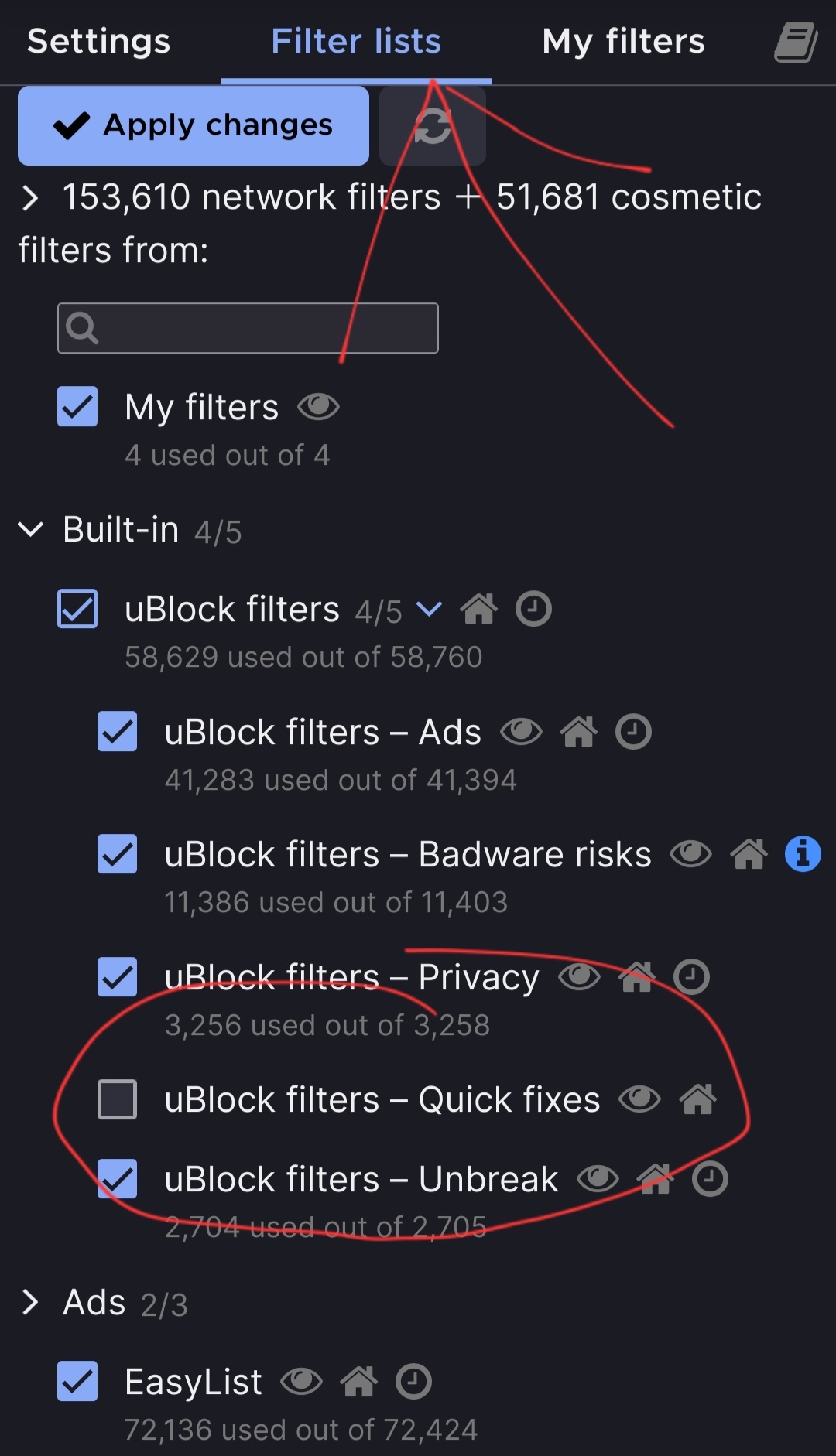

Ah, well that’s not ideal. I’m surprised just disabling the “Quick fixes” list resulted in ads appearing again; that didn’t happen for me. Have you tried updating the filter lists after disabling the “Quick fixes” one?


Ah, well that’s not ideal. I’m surprised just disabling the “Quick fixes” list resulted in ads appearing again; that didn’t happen for me. Have you tried updating the filter lists after disabling the “Quick fixes” one?


If uBlock Origin was working fine until recently, you can try this workaround (it worked for me when YouTube suddenly started showing me “Ad blockers are against YouTube TOS” messages):
Open uBlock settings in Firefox, go to “Filter Lists” and uncheck “uBlock Filters - Quick fixes” under “Built-in”.

Then click “Apply changes” and restart Firefox. Hope this helps.


Is it as interactive as Lemmy or is everyone kinda shouting into the void?
I’d say it’s a somewhat different kind of interactivity than Lemmy. Your typical Mastodon user won’t have many followers, but that doesn’t mean you’re “shouting into the void”. Similar to Lemmy, you can comment on (reply to) others’ posts and lots of other people can join in the discussion that way.
Is there an equivalent to communities?
Not really, but you can follow hashtags for whatever topics you’re interested in. Or follow an account for something you’re interested in (e.g.: organizations, weather, hobby news, content creators, etc)
If not, how do you find stuff you care about?
Follow people/organizations/tags that you find interesting and their posts will populate your feed.
And is reblogging the equivalent to upvoting? Is it like a like and share in one?
Not necessarily. Reblogging (“boosting” on Mastodon) is just putting more eyes on someone else’s post by sharing it; it isn’t equivalent to an endorsement per se. You can favorite posts on Mastodon, but I don’t think there’s really an equivalent to a “like” or “upvote” button.
Do they have memes there or what’s the range of content?
The range of content is as wide as anywhere else, memes and all. Can vary from instance to instance, though. (e.g.: code of conduct on mastodon.social may be different from fosstodon.org’s)
How does it compare to bluesky? I have used bluesky but the tone there is kinda shallow imo, rarely any meaningful interactions.
I haven’t used bluesky, so I can’t comment on this one.
I haven’t had to deal with this specific kind of use case before (accessing the local Jellyfin service while the laptop is connected to a VPN), but after some cursory research, one of these approaches may work for you:
Easy Option (only available on some VPN software):
There may be an option in your VPN client that lets you access local network addresses like your Jellyfin server. Check your settings and see if there are any options like “allow local network traffic” and then try opening up your Jellyfin server in a browser (e.g.: http://192.168.1.100:8096/)
Less Easy Option:
If your VPN client doesn’t have an option for allowing local traffic, you can open up the command prompt on your macbook and run a command like this:
sudo route add -net 192.168.1.0/24 192.168.1.1
Where 192.168.1.0/24 is the local network you want to connect to (where the Jellyfin server is located), and 192.168.1.1 is your local gateway (probably your wifi router’s address). Change both of these depending on how your network’s local IPs are formatted.
This should update your routing table to handle local network addresses without the VPN and this should persist between reboots.
Hope this helps.


That’s super neat. I still have my physical copy of this game from back in the day. I’ve booted it up in a Windows 98 VM before, but that’s way more hassle than just opening it in Firefox.


Her science-oriented methods break down when it comes to (in the broadest sense) “supernatural” phenomena - because they are, by definition even, outside science.
I only watched the first 2 or 3 seasons of The X-Files, so I there’s lots of episodes I haven’t seen, but this seems incorrect to me. Scully and Mulder were chasing unexplained phenomena, which are entirely within the realm of science. Humans tend to call things “supernatural” when we don’t know how to explain them (ghosts, monsters, aliens, etc), but those entities (in the context of The X-Files where they are actually real), once observed, can be subjected to the scientific method the same as anything else. Aliens and cryptids and such in The X-Files aren’t magic; it’s just extremely rare for humans to be able to observe and study them.


All these years later, I still can’t believe they got Tyson Hesse, the guy who did this ridiculous Sonic fan comic, to oversee the redesign of the Sonic model for the film. What a crazy world we live in.


Depends on the individual. Some people will be hospitable regardless of your skin color, but will be less hospitable based on your religion, gender, sexuality, or any number of other factors.


If memory serves, Alpine is not entirely free of GNU software. Checking their own website, they use GCC and GNU Make:
https://pkgs.alpinelinux.org/packages
But even when/if Alpine (or anyone else) creates a distro entirely free of GNU software, the vast majority of mainstream distributions would still fall under the “GNU/Linux” umbrella when the typical user is discussing Linux.


“Mmmmm, PFAS.” seems like an oversimplification, given that the study’s conclusion states
individuals reporting the use of dental floss had lower levels of serum PFASs overall, with the exception of PFOA, which was slightly elevated.
Not quite. You understood that the blue character was correct. You just missed that the joke was that yellow was wrong.
I think the point of the joke is that the yellow character has fundamentally misunderstood the statement provided by the blue character. They erroneously interpret, “All squares have four sides” as “Squares are the only shape with four sides” because they are not good at parsing rigid, scientific statements (since most people are not particularly scientifically literate).
I think OP’s comics are meant to reflect the frustrations of conversing with people who simply don’t understand what science/research/studies/etc actually say.


I was being sarcastic, lol. It’s a play on the “you have to have a very high IQ to understand Rick and Morty” gag.


Episodes of Rick and Morty really hit close to home in a way that normies couldn’t possibly fathom. It’s a blessing and a curse.


LLMs are pretty good at reverse dictionary lookup. If I’m struggling to remember a particular word, I can describe the term very loosely and usually get exactly what I’m looking for. Which makes sense, given how they work under the hood.
I’ve also occasionally used them for study assistance, like creating mnemonics. I always hated the old mnemonic I learned in school for the OSI model because it had absolutely nothing to do with computers or communication; it was some arbitrary mnemonic about pizza. Was able to make an entirely new mnemonic actually related to the subject matter which makes it way easier to remember: “Precise Data Navigation Takes Some Planning Ahead”. Pretty handy.


You might enjoy Sid Meier’s Civilization games. I’m partial to Civ 6, but they’re pretty much all in the same vein of management games.


Short, sweet, and catchy. They did a good job with that one.


Damn, that’s a shame.
Seems like you have perfectly valid concerns regarding the logistics of making such a move. Have you brought up these concerns with him? If so, does he acknowledge them or ignore them?